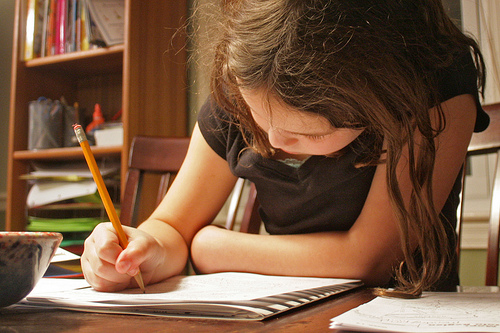Sometimes the writing doesn’t have to be brave
Sometimes the writing will dribble off the page and puddle around your feet. Spare t’s and floating dots over i’s, unimaginative terms like “good” and “fun,” lack luster sentences of uncertain viewpoint…this is the stuff of regular writing, as much as any brave revelation of a person’s interior or a keenly carefully observed guava—poked, prodded, and tasted.
The days of writing accumulate, just like the days of potty training or balancing on a bike or eating salad.
They aren’t glamorous, and often the contents, particularly of freewrites, feel a bit frightening. I confess: I panic a little each time it’s my turn to read and comment on a freewrite. There’s that moment where the words clack into each other and the sound is unclear—the heart and meaning undifferentiated, and the terms out of tune. I worry that this will be the One Time when I won’t have the right feedback that moves the piece forward or that will support the child’s risky (albeit, bland) self-expression.
To calm myself, I remember that my job isn’t to fix, prop up, or find what isn’t there. My job is to read.
And so I begin.
I read the writing. I notice that it fills the page (or doesn’t). I notice that there are words, lined up—as many as there are. I read them and let myself hear them and feel them. If the words are “unremarkable,” sometimes I ignore the meaning and listen to the sounds—as though hearing English as a foreign language.
I let the writing speak; I do not judge it.
This is the first step in being a brave reader. It is an easy thing to read a piece of writing that pops off the page and entices you forward into its tributaries of well-chosen language and clever ideas. It’s another to accept what is offered and to know that it doesn’t have to shine or sing or stand out above other efforts.
Thank the writer. Be earnest, rather than disappointed (it’s easier to not be disappointed if you go into the reading looking for what to affirm and choosing to find something—one thing!). You can always affirm effort, complete sentences, handwriting, a well-placed piece of punctuation or capitalization, congruence between subject and verb (why not notice that and say “Well done” rather than only noticing when it’s “off”?), and the single best word in the piece. Maybe that word is “I”—how the writer (your child) showed you his or her viewpoint and you appreciate it.
Not all freewriting will delight you or speak to you immediately. Sometimes you must be patient—just like when you go to game after game after game of soccer and your daughter runs along the inside of the sidelines as though she is playing, but really she’s just avoiding the ball. You still cheer, you still hope she’ll bump into it and make contact and be a participant. She still gets the orange slices and juice pack. She sweats and runs and cares.
Then there’s that one day when she least expected it—the ball is right there, right next to her foot and she sees the open net—and out of nowhere, she boots that ball into the goal—no one is more shocked than she is and you cheer even louder!
You loved her no less before, and not more now—you just feel that affection a bit more deeply in that moment. You know she’s a soccer player in a new way.
That’s how it works with writing, too. You can coach, you can share strategies to help ease the challenge. But sometimes it takes a lot of running up and down the sidelines, cowering a bit, avoiding the ball, but hanging around the game anyway, before your child scores.
That’s how it’s supposed to be. Keep finding reasons to cheer. That’s what brave readers do.
Cross-posted on facebook.


















